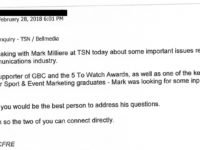Having examined how Brock University and George Brown College (part one and part two) came to support the Bell coalition website blocking plan, this post relies on Ryerson documents obtained under access to information laws to reveal how Charles Falzon, Ryerson’s Dean of Communications and Design, came to write in support of the site blocking plan. Much like the other two institutions, Falzon was approached by Mark Milliere, a Bell executive, asking for Ryerson’s support for the initiative.
Post Tagged with: "copyright"
“One of Our Key Hiring Companies”: The Missing Link in the George Brown College Support for Bell’s Site Blocking Plan
Earlier this year, I posted the results of an access to information request to George Brown College (GBC) that sought to explain how the college came to publicly support the FairPlay website blocking proposal at the CRTC. Much like similar documents from Brock University, the George Brown College documents showed a request from Mark Milliere, an executive at Bell-owned TSN, about a week before the deadline sparked the submission. The resulting letter, which came from GBC President Anne Sado, was cited by the Bell-led coalition in its reply letter to the CRTC.
The First Rule of Copyright Reform: Don’t Mess With Free Speech and Net Neutrality
Countries around the world have been actively rethinking copyright for the digital age, grappling with the potential for the Internet and new technologies to facilitate new creativity and business models as well as the need for fair remuneration for content creators. The European Union has been particularly active on the issue with a two-year copyright reform process that was billed as providing an update for the digital environment.
As the process neared its conclusion earlier this month, the European Parliament experienced the equivalent of a copyright political earthquake. My Globe and Mail op-ed notes that hundreds of elected officials shocked observers by voting against quick approval of a reform package that would have led to blocked access to thousands of legitimate works through upload content filters alongside new “link taxes” that would have charged sites for linking to news stories online.
Movie Industry Denies Lawsuit Strategy Despite Proliferation of Legal Actions and Settlement Demands Against Thousands of Canadians
Over the past several years, hundreds of thousands of Canadians have received notifications from movie and television interests threatening high-priced lawsuits unless they agreed to pay settlement fees. Moreover, a recent strategy led by the law firm Aird & Berlis has resulted in hundreds of actual legal filings against individuals, using a reverse class action strategy described as a “legal machine”. Yet despite the proliferation of lawsuits and demand letters, the head of the movie industry in Canada recently told the Standing Committee on Industry, Science and Technology that lawsuits against individuals were not part of their legal strategy.
Unpacking Canada’s IP Strategy: Countering IP Abuse, Addressing IP Administration and Removing IP Barriers to Innovation
Navdeep Bains, Canada’s Minister of Innovation, Science and Economic Development, unveiled the government’s long-awaited intellectual property (IP) strategy, which responds to the need to increase IP awareness, develop new IP tools for businesses and counter IP misuse that harms both consumers and businesses. Following Bains’s announcement in April, the strategy garnered widespread applause for its holistic approach to IP policy, which recognizes the need to support IP through a combination of better information, administration and corporate practices.











